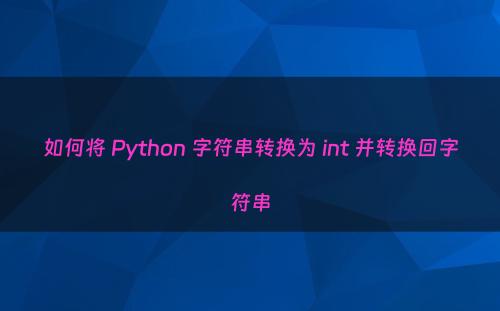如何将 Python 字符串转换为 int 并转换回字符串
6 分钟阅读
将 Python 字符串转换为 int 以及从整数转换为字符串的各种方法。您可能经常需要在日常编程中执行此类操作。因此,您应该了解它们以编写更好的程序。

此外,整数可以用不同的基数表示,所以我们也将在这篇文章中解释这一点。并且碰巧存在转换失败的情况。
顺便说一下,如果您对 Python 数据类型有一些基本知识,这将很有用。
Python 字符串到 int 和 int 到 string 的转换
对于程序员来说,了解不同的转换方法至关重要。当您从外部源(如文件)读取或接收数据时,它可以是数字,但采用字符串格式。或者有时,我们使用字符串以样式化的方式显示。
稍后,在操作或更改数字时,您需要将字符串转换为整数或适当的类型。因此,现在让我们看看如何将 Python 字符串转换为 int 并检查所有 +/-ve 场景。
int() 将 Python 字符串转换为 int
Python 提供了一个标准的整数类(类 'int')来处理数值运算。它带有 int() 构造函数方法,可用于将字符串转换为 int。
让我们在一个例子的帮助下检查一下 int() 函数的实际运行情况:
"""
Python Example:
Desc:
Use Python int() function to convert string to int
"""
# Salary per year in string format
SalaryPerYear = '1000000'
# Test the data type of 'SalaryPerYear' variable
print("Data Type of 'SalaryPerYear': {}".format(type(SalaryPerYear)))
# Let's perform string to int conversion
SalaryPerYear = int(SalaryPerYear)
# Again, test the data type of 'SalaryPerYear' variable
print("Data Type of 'SalaryPerYear': {}".format(type(SalaryPerYear)))下面是执行上述代码后的结果:
Data Type of 'SalaryPerYear': <class 'str'>
Data Type of 'SalaryPerYear': <class 'int'>从不同的基数转换整数
整数类型值的默认基数为 10。但是,在某些情况下,字符串可以包含 10 以外的其他基数的数字。
基数或基数是计数系统用来表示数字的不同数字或数字和字母的组合。
如果您想了解更多关于基数的概念,请参考这个 – 数学基数。
在转换这样的数字时,您需要在 int() 函数中指定正确的基数才能成功转换。它将采用以下语法:
# Syntax
int(input_str, base_arg)基参数的允许范围为 2 到 36。
这里要注意的一点是,结果将始终是以 10 为基数的整数。查看如何在 Python 中连接字符串以及下面的代码,以了解来自不同基础的字符串到整数的转换。
"""
Python Example:
Desc:
Use Python int() function to convert string to int from different bases
"""
# Machine Id in string format
MachineIdBase10 = '10010'
MachineIdBase8 = '23432' # 10010 => base 8 => 23432
MachineIdBase16 = '271A' # 10010 => base 16 => 271A
# Convert machine id from base 10 to 10
MACHINE_ID = int(MachineIdBase10, 10)
print("MachineID '{}' conversion from Base 10: {}".format(MachineIdBase10, MACHINE_ID))
# Convert machine id from base 8 (octal) to 10
MACHINE_ID = int(MachineIdBase8, 8)
print("MachineID '{}' conversion from Base 8: {}".format(MachineIdBase8, MACHINE_ID))
# Convert machine id from base 16 (hexadecimal) to 10
MACHINE_ID = int(MachineIdBase16, 16)
print("MachineID '{}' conversion from Base 16: {}".format(MachineIdBase16, MACHINE_ID))当您执行给定的代码时,它会转换具有相同数字但基本格式不同的字符串 (MACHINEIdBase)。并且MACHINE_ID的输出值始终以10为基数。
检查转换中的错误/异常
在将字符串转换为 int 时,也可能出现错误或异常 (ValueError)。当值不完全是一个数字时,通常会发生这种情况。
例如,您正在尝试转换包含使用逗号格式化的数字的字符串。或者它存储十六进制值,但您错过了传递 base 参数。
因此,您可能需要处理此类错误并采取一些预防措施。请查看以下示例以了解。
"""
Python Example:
Desc:
Handle string to int conversion error/exception
"""
# Salary variable holds a number formatted using commas
Salary = '1,000,000'
try:
print("Test Case: 1\n===========\n")
numSalary = int(Salary)
except ValueError as ex:
print(" Exception: \n ", ex)
newSalary = Salary.replace(',', '')
print(" Action: ")
numSalary = int(newSalary)
print(" Salary (Int) after converting from String: {}".format(numSalary))
# MachineId
MachineId = 'F4240' # 1,000,000 => base 16 => F4240
try:
print("\nTest Case: 2\n===========\n")
MACHINE_ID = int(MachineId)
except ValueError as ex:
print(" Exception: \n ", ex)
print(" Action: ")
MACHINE_ID = int(MachineId, 16)
print(" MACHINE_ID (Int) after converting from String: {}".format(MACHINE_ID))
该示例包括两个测试用例。当字符串包含格式化数字时,第一个显示错误。第二个由于基值不正确而失败。运行代码后,将得到以下结果:
Python Int to String
还有另一个名为 Str() 的 Python 标准库函数。它只是取一个数字值并将其转换为字符串。
但是,Python 2.7 也有一个名为 Unicode() 的函数,用于生成 Unicode 字符串。但它在 Python 3 或更高版本中不可用。
查看以下示例:
"""
Python Example:
Desc:
Use Python str() function to convert int to string
"""
# Numeric Machine Id in Hexadecimal Format
MachineIdBase16 = 0x271A # 0x271A ==> 10010
# Convert numeric Machine Id to Integer
MACHINE_ID = str(MachineIdBase16)
print("\nMachineID ({}) conversion from Base 16: {}\n".format(hex(MachineIdBase16), MACHINE_ID))
print("MachineIdBase16 type: {} => Post CONVERT => MACHINE_ID type: {}\n".format(type(MachineIdBase16), type(MACHINE_ID)))下面是执行上述代码后的输出片段:
将 Python int 转换为字符串输出
主要说明
- 类型转换是将对象从一种类型转换为另一种类型的过程。
- Python 会自动执行称为隐式类型转换的转换。
- Python 确保在类型转换中不会发生数据丢失。
- 如果调用函数来转换类型,则该过程称为显式类型转换。
- 显式强制转换可能会导致数据丢失,因为用户会强制执行此操作。
